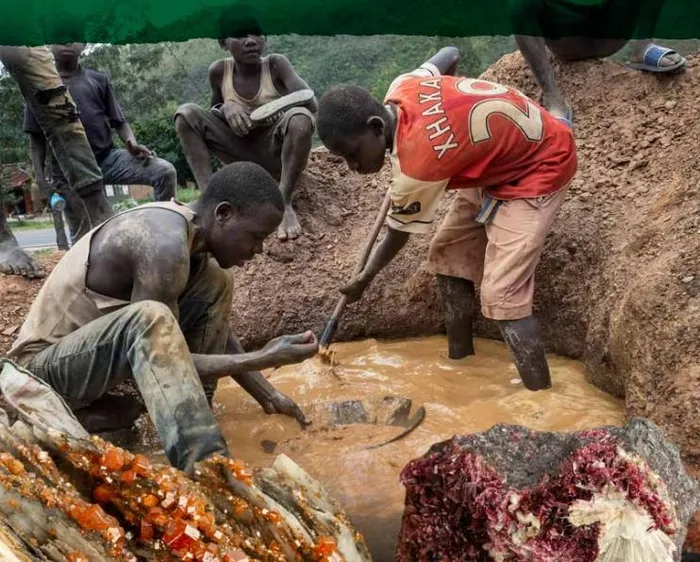
Sub-Saharan Africa is home to some of the world’s most essential critical minerals from cobalt and manganese to graphite and platinum, powering the global clean energy transition. Yet in mining regions from the DRC to Zambia to Zimbabwe, communities continue to face unsafe labour conditions, polluted environments, and unequal benefits from extraction.
Image: Supplied
Banele Ginindza
Africa is losing billions of dollars every year through illicit financial flows (IFFs) from its mineral sector, undermining the continent’s potential to benefit from the global clean energy transition, according to a new report by Greenpeace Africa on Wednesday.
The report, titled "Africa’s Critical Minerals: A Development Lifeline or a New Green Resource Curse?" warns that IFFs have become “increasingly widespread and complex,” allowing multinational mining companies to avoid paying taxes and depriving African governments of vital revenue.
It estimates that South Africa has lost more than $10 billion (more than R170bn), while Nigeria loses more than $17bn every year through corporate tax evasion and profit shifting in the extractives industry.
Citing the African Union’s African Minerals Development Centre, the report notes that since 1980, about $1.3 trillion has left sub-Saharan Africa through IFFs — 60% of it from the resources sector.
Greenpeace said while the resource curse remains a defining feature of many resource-rich countries, not all are affected to the same degree.
South Africa and Botswana, for instance, have developed policies to mitigate the worst effects, unlike the Democratic Republic of Congo, which has displayed the classic symptoms of the phenomenon.
The report highlights South Africa’s vast reserves of manganese and vanadium, two minerals essential to the global clean energy transition. Manganese is a key component in lithium-ion batteries, while vanadium is used in vanadium redox flow batteries (VRFBs).
Despite this, South Africa exports most of its manganese and vanadium to China, where they are processed into battery materials. Greenpeace said that if South Africa invests in domestic value addition, up to 60 000 new jobs could be created in the battery sector by 2030.
"South Africa can realise these jobs by increasing battery assembly, increasing the processing of minerals to battery grade and commercially developing VRFB," it said.
"Research indicates that strong government policies (regulations, laws, taxes and tariffs) to support the industry are required, such as a commitment to use utility-scale batteries in national energy systems to boost early development."
Beyond battery production, the report said South Africa has significant potential in renewable energy manufacturing, already assembling solar PV components, wind turbine towers, and related equipment.
With its strong industrial base — including mining, automotive, and electro-technical industries — the country is well-positioned to capture more of the renewable energy value chain.
Encouragingly, the report notes that Cabinet’s recent approval of the Renewable Energy Masterplan (REMP) could provide the policy certainty needed to unlock industrial growth.
"The Plan seeks to develop industrial value chains throughout the renewable energy sector in South Africa and should hopefully provide the policy certainty that the sector needs to grow and take advantage of South Africa’s critical minerals," it noted.
The report also raises concerns over the proliferation of bilateral agreements between African governments and foreign powers seeking access to critical minerals.
"Dozens of bilateral agreements have already been signed between African states and other countries. For example, South Africa, Zambia and the DRC have committed to at least six bilateral agreements over critical minerals, while China has signed eight bilateral agreements for critical minerals with countries from Sub-Saharan Africa," the report noted.
"This 'lack of coordination and fragmentation among African countries has played in favour of global superpowers so far' because African countries are weaker when they negotiate individually."
Greenpeace warns that these deals, often rooted in Colonial-era dynamics, threaten to undermine regional cooperation and perpetuate dependency rather than sustainable development.
The report acknowledges that several African countries — including Ghana, Liberia, Mozambique and South Africa — have introduced local content legislation requiring foreign mining firms to source goods and services locally and employ local workers. However, enforcement remains weak.
"As with all policies, however, their quality and enforcement are key," it said.
"Critics have argued that in some instances local content requirements are unrealistic as some countries lack the local capacities to deliver the required goods and services, meaning that the enforcement becomes ‘loose’."
Greenpeace concluded that without coordinated policies, strict enforcement, and transparent governance, Africa’s critical minerals could become the centre of a “new green resource curse” — enriching global corporations while leaving African economies underdeveloped.
BUSINESS REPORT